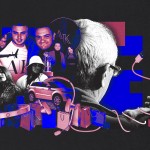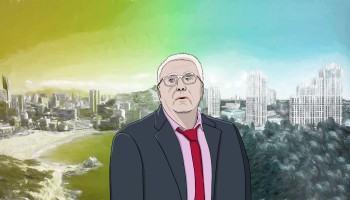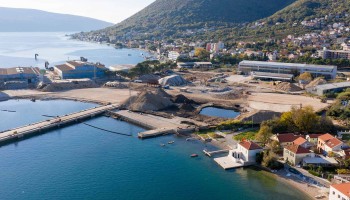Cypriot police are nearing the end of their probe into the allegedly fraudulent recapitalization of an insurance company that collapsed in 2018, leaving more than 200,000 drivers mainly in Bulgaria without coverage, and unpaid claims of 44.8 million euros.
But an investigation by OCCRP and its Bulgarian member center, Bivol, shows that Cyprus-based Olympic Insurance Company Limited fell into the hands of suspected crime bosses long before it failed.
Hiding behind two Cypriot lawyers who acted as proxies, alleged Bulgarian gangsters gained control of Olympic almost a decade before a Spanish businessman took over the company and cannibalized it with the help of an associate who was a convicted cocaine dealer.
Olympic’s demise raised questions at the time about due diligence procedures at Cyprus’ Insurance Company Control Service (ICCS), which oversees the sector. National legislation requires the ICCS to appraise the reputation and financial soundness of potential insurance company owners. Many accused the ICCS of failing to properly vet Diego Gonzalez Alonso, the Spanish national who took over the company in 2016 when it was facing financial collapse.
“If [the] office had done its research, it would have found that the man buying the firm had a suspect business reputation that had been highlighted by other EU countries,” wrote the Cyprus Mail’s editorial board in August 2018. “Who would buy a small insurance company teetering on the verge of bankruptcy?”
OCCRP’s investigation shows that Alonso not only bought the heavily indebted firm, but then funneled at least 2 million euros out of Olympic and into his own companies.
Authorities in Cyprus also failed to notice signs that — long before Alonso entered the picture — Olympic was controlled behind the scenes by a criminal organization in Bulgaria that used two companies from that country as fronts: Intergroup and Security Insurance Company (SIC).
Cypriot police would not confirm if they looked into ties between Olympic and Intergroup, which a leaked U.S. diplomatic cable from 2005 claimed ran schemes in Bulgaria including financial fraud, extortion, drug dealing, and prostitution.
“The investigation of the case is at an advanced stage,” police said in a brief emailed response to questions.
Although police did not respond to questions about whether Alonso is likely to face charges, their investigation was triggered by a “written complaint” from the ICCS in 2018, which alleged that the Spanish businessman had used “non-existent” assets to recapitalize Olympic.
Alonso had swooped in with promises of investment backed by corporate bonds and holdings in a bank he claimed to own in the East African island nation of Comoros. But auditors say these were vastly inflated in value, if they existed at all. They also questioned the value of property holdings in the Dominican Republic that he used to back his recapitalization plan, while a court found Brazilian government bonds he listed were fake.
By the time ICCS noticed irregularities at Olympic, it was too late; the company had already been gutted. Olympic’s collapse has been attributed to a pattern of supervisory failure in Cyprus’ financial system.
“The Cyprus consumer and taxpayer have already paid too much due to lapses in regulation, across both banking and insurance," said Alexis Pantazis, executive director of the insurance company Hellas Direct, which is based in neighboring Greece.
“Regulators have to pick up their game and keep pace with modern-day trends, communicating openly with their respective counter-parties across borders.”
The ICCS declined to answer questions submitted by reporters.
Economic Meltdown
Olympic Insurance’s financial trouble started in 2013, when Cyprus was rocked by a financial crisis, partly caused by lax banking supervision. The country’s two largest banks failed, losing about 8 billion euros of customers’ deposits. The International Monetary Fund and European financial institutions agreed to a rescue plan, but they refused to bail out undercapitalized banks, citing their histories of money laundering.
By December 2015, Olympic was about to collapse after posting 12 million euros in losses, leaving it 5.7 million euros in the red.
Alonso’s recapitalization plan — to be implemented in part via corporate bonds issued by his Luxembourg-based holding company Hispakol S.A. — seemed like a godsend. But if his promises seemed too good to be true, that’s because they were.
It took the ICCS months after approving Alonso’s bid to become suspicious about how Olympic was supposedly recapitalized, and to instruct auditors to examine the fresh assets he said he had injected.
In their report, submitted to ICCS in late 2017, the auditors said there was “uncertainty” about the real estate in the Dominican Republic that Alonso said was worth 26.3 million euros, as well as 150 million euros in Brazilian government bonds and corporate bonds.
Later, auditors also questioned the existence of 11.9 million euros Olympic said it held in Black Eagle Securities Bank, which claims to be registered in Comoros. Olympic’s financial statements note that Black Eagle had purchased Alonso’s New York Securities Bank (NYSB), which was also said to be registered in the East African island nation.
However, the Central Bank of Comoros told OCCRP that neither Black Eagle nor NYSB had a banking license in the country.
There were other warning signs about Alonso out there for anyone who cared to look.
In 2015, Spain’s financial market regulator, Comision Nacional Del Mercado de Valores, published a notice that Alonso was not authorized to provide investment advice, or other services such as foreign exchange transactions, through his NYSB branded companies — including the fake Comoros bank.
Once Alonso’s takeover of Olympic was approved, documents show he unofficially brought in a convicted drug dealer, José Miguel Muñoz Martín, to represent him in the company.
In August 2018, after it became public that Olympic’s license had been revoked, Cyprus-based accounting firm CRI Group Limited submitted a report to the ICCS saying Martín had a serious criminal record. Court documents from Spain confirm he was convicted of cocaine trafficking about a decade ago.
OCCRP’s investigation shows that Alonso started siphoning money out of Olympic Insurance almost immediately after taking over in 2016, using several companies that he owned.
For instance, Olympic paid more than 300,000 euros for unspecified consulting services to Ozo Group, a company of his based in the Latvian capital of Riga and later renamed NYSB Latvia.
According to its financial statements, Olympic also made a 1-million-euro loan to Integral de Gestiones Societarias SL, which is based in Tenerife, the largest of Spain’s Canary Islands. Records show the loan was secured with shares in an Integral subsidiary, Aerlyper S.A., which was already in liquidation.
In addition, Olympic made in 2016 a payment of 570,227 euros to NYSB Fund Management. Olympic’s financial records state that the payment was made to underwrite corporate bonds. Whether the bonds were actually issued or not is unclear.
Alonso did not respond to a request for comment. Munoz Martin could not be reached.
Bad Company
After the ICCS announced in August 2018, that it had revoked Olympic’s license, details began to emerge in Cypriot and Bulgarian media about Alonso’s alleged fraud.
The scandal pushed Bulgaria’s head of insurance supervision to offer her resignation, which was accepted by lawmakers who had convened an extraordinary session of Parliament to discuss Olympic’s liquidation.
In the midst of the controversy, a former head of Bulgaria’s State Agency for National Security took to social media to criticize his government for allowing the insurer to operate in the country. In a Facebook comment picked up widely by national media, Atanas Atanasov said Bulgarian authorities — including the security services and the finance ministry — were aware that the alleged gangsters behind Intergroup and SIC were also the secret owners of Olympic.
Atanasov reiterated those comments in a recent phone interview with OCCRP, saying: “This is the same group.”
Olympic’s criminal association stretches back to 2007, when it was bought by Cyprus-registered Clenmay Enterprises Limited, which was on paper owned by a Russia-based Cypriot lawyer. The OCCRP investigation shows that the real owners of Clenmay were involved in Intergroup.
Aside from allegedly carrying out an array of criminal activities — drug dealing, fraud, prostitution, and extortion — the people behind Intergroup and SIC owned a number of legal entities, including Bul Ins, Bulgaria’s largest automobile insurer, according to a 2005 US diplomatic cable published by the anti-secrecy website Wikileaks.
Intergroup and SIC’s insurance interest dovetailed nicely with its business in stealing and trafficking vehicles, the cable noted: “Automobiles insured by Bul Ins display special identity stickers meant to protect them from being stolen; cars not insured by Bul Ins are considered fair game.”
Among the owners of Intergroup, SIC, and Bul Ins were the brothers Krasimir and Nikolay Marinov, according to the US diplomatic cable and reporting by OCCRP.
Nikolay Marinov was a director of both SIC and Intergroup, while Krasimir was listed as director of the latter.
Krasimir and his younger sibling Nikolay, who are known in Bulgaria by the nicknames “Big Marguin” and “Little Marguin,” were indicted on several charges in Bulgaria, including membership in an organized crime group, conspiracy to commit murder, and money laundering, but were later released.
Prime Minister Boyko Borisov also has reported links to the group. In 1995 he was photographed with Krasimir Marinov, Rumen “The Pasha” Gotsov, and other mob bosses at an SIC anniversary party. Bulgaria’s Capital Weekly newspaper described Borisov, who ran a security services company before becoming prime minister in 2009, as acting like a “press officer” for Intergroup/SIC.
In December 2007 – just weeks after Bul Ins’ offices in Sofia were raided by police – the Marinovs took control of Olympic through Cyprus-registered Clenmay Enterprises Limited.
Although their names did not appear on official ownership documents, circumstantial evidence collected by OCCRP appears to show that the brothers may have controlled Clenmay through two proxies: Cypriot lawyers named Andreas Th. Sofokleous, who was listed as one of its directors, and Georgios Angeli, the sole shareholder who got permission from ICCS to buy Olympic.
Angeli and Sofokleous owned Cyprus-registered Transcapital Business Consulting (TBC), which offered various company management services, including the option for them to act as nominees for beneficial owners of firms who prefer not to be named.
Sofokleous did not respond to questions about whether he and Angeli had acted as proxy owners of Olympic for the Marinovs. He said TBC followed all laws and regulations pertaining to forming and administering companies, “especially the validation of the beneficiary of the company Clenmay Enterprises LTD, [and] has fully complied with its obligations in all stages it provided services to this company.” Angeli declined to comment.
Given that the owners on paper were professional proxies, the Marinov brothers appear to be the most likely candidates to be the real owners based on a series of connections OCCRP has made between them and the company.
A Web of Corporate Connections
A key connection is Rosen Todorov, who was chief accountant of SIC in 1995 and 1996, and financial director in the subsequent two years. Along with Krasimir Marinov, Todorov was on the board of directors of the company.
In 2015, Angeli and Sofokleous sold US-based Kudos LLC, parent company of Bulgarian real estate company Kudos Bulgaria EOOD, to Todorov. And until 2017, Angeli and Sofokleous owned Emperion Investments Limited, which in turn owned shares in Veedex Enterprises Limited, a transportation company. Those shares were transferred to Todorov in 2014.
Todorov said that Angeli, the Cypriot lawyer, recruited him as a consultant due to his expertise in the insurance sector when he was about to purchase Olympic in 2006. Todorov worked with Angeli until 2012, and said there was no indication that the Marinovs or any others were the beneficial owners.
“Throughout our cooperation, to the best of my knowledge, George Angeli was the sole owner of Olympic Insurance Company,” Todorov said in an email.
The Bulgarian trade register provides information about another figure linking Olympic to Bul Ins, which the Marinovs own. Krum Krumov is the current manager of Bul Ins; between 2011 and 2012 he managed Olympic’s Bulgaria branch.
The fallout from the failure of Olympic is still playing out in both countries, as it remains unclear which institutions will cover outstanding claims that total as much as 44.8 million euros.
Bul Ins did not respond to requests for comment. The company continues to offer auto insurance in Bulgaria.
Additional reporting by Jelter Meers.






